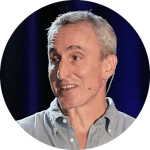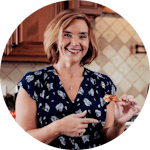847 views Add as favorite
Table of contents
0:45 Campbell Murdoch’s story
1:54 Presentation of Dr. David Unwin
4:11 About mental representation
8:24 Sharing experiences: Dr. Joanne McCormack about her eight-week behavioral-change program
13:26 Sharing experiences: Dr. David Unwin on making change within practise
16:15 Sharing experiences: How to address weight loss with your patients
20:58 Sharing experiences: Stop the shaming and blaming
23:58 Sharing experiences: Understanding the psychology
26:10 Sharing experiences: Test hemoglobin HbA1c after one month on low carb
28:15 Sharing experiences: Spreading the word
29:24 Sharing experiences: Thoughts on calories
30:26 Sharing experiences: Big Pharma
31:51 Sharing experiences: Publicity
33:00 Final words
Transcript
Dr. Campbell Murdoch: A quick introduction about me. I’m a GP for two days a week. And I’ve got a job at Somerset CCG as Person Center Care-Lead, which for me is about human-centred care, what it is for humans, how do we optimize human health and wellbeing.
And I’ve got a job with Public Health England promoting physical activity and with that, everything that improves insulin sensitivity alongside that. And also with the NHS alliance which is all about creating health. The primary care is the title of this topic but as everyone knows now primary care is no longer a castle with a moat and drawbridge, but is about the community and everyone so even if you don’t work in a GP practice, you’ll still be a part of primary care. So it’s applicable to everyone.
My story into this was the… and why I’m here today, connected with David is last April I was on a flight to the States to see the New York Medicaid system. And the three glasses of wine hadn’t gotten me to sleep after the night flight. So Shutter Island which some of you may have seen, with Leonardo DiCaprio, and he is a detective in the film and doing really well, just at the end of the film he turns out he is not psychotic, he is in a cave, just like all of you.
You’re probably thinking, “This thing is so obvious, am I missing something?” So actually is about connecting us all. So this session is going to be about really all of us and we’ve probably got all the knowledge in the room between us to completely flip the world if we decided to do it.
And it’s drawing out all that knowledge. It’s being videoed, so if anyone speaks, they will be videoed, showing speak to these guys at the end, if there’s a problem with that. And we’re going to try and collect all this information and produce some helpful documents and start connecting everyone around the place. David, do you want to say anything?
Dr. David Unwin: I think you’ve all heard quite enough from me. Well, it’s fun I’d say and it is so magical to connect with your patients. The group work, particularly, I was so frightened of doing group work. You become very confident on the one-to-one, but groups, you feel like you let go of your comfort blanket.
And you’re just not sure what the patients will do to you really. But it’s amazing. When you let go and you let a group evolve, they’re very respectful, very kind, and you develop such a relationship. They don’t take advantage of it either.
So we’ve been doing groups now for four years. So you’re not pestered to death with, “I’m on this tablet, this cream, you know, my anti…can I have…?” They don’t do that at all, they use the time really well. and it’s been a great experience with the group work and I expect we’ll talk about that. So I would encourage people to think about running groups. You can do 20 at a time, so it’s quite efficient and pleasurable.
So I do it as an extra, because it doesn’t exhaust me, I’m not tired. You know the way we all feel at the end of the day, doing the mindless clicking of the repeat prescribing. You just want to give up. But it doesn’t give you anything back, does it? That kind of medicine gives you nothing back, but I find group work particularly gives you back and I have more energy for that and more enthusiasm for general practice than I’d had for so many years. So I think it’s useful to look how we did that.
Campbell: Brilliant, thank you. So we will very quickly go through some very simple stuff about– Like you were saying early, I think we’re about to hit the exponential curve and shoot up, my prediction is for the end of this year at least in England, I think we’ll hit that tipping point. And going beyond what we’ve seen in the last six months that has shown we are on that journey and it’s really exhilarating.
And I’m a firm believer as well that 99.9% of the population are lovely people if that’s the case. This isn’t about people understanding this, is not about them being nasty or anything, it’s just about how the human brain sees things. Mental representation, so how do we see things and then how does that change how we do things.
So I created this slide to, so to say, the emerging or the previous theory, diabetes is progressive, it requires medication, causes heart disease, loss of sight, kidney disease, it’s becoming increasingly prevalent, why lifestyle change might have an impact, but it’s tough to do and you can’t sustain it. So the feeling I guess it was despair. So what are you going to do about that? You got a increase in mortality, morbidity and loss of healthcare costs. The flipside, you change the mental representation to the belief it’s a preventable condition, is a reversible condition.
The lifestyle change is enjoyable and easy to do, it negates the need for medication which is a question of benefit anyway, complications are prevented, feeling – hope and outcome improved health and well-being of individuals population and health and social care system is saved. So the simple reframing– The job’s done. So why do people still sit in that slide? Although probably most of them are transitioning now.
But why people still sit in that slide? They are not bad people. They haven’t really seen this yet I guess, as many of you are seeing the slides now. They’re happening all the time. So we know we are not in the cave on the Shutter Island. If you’ve seen this before, don’t say anything, but this is just to try and highlight the fact that we are human and what we see and what we believe is not necessary factual. So which square is darker, A or B?
Both are exactly the same and you know now that. Yes, but you can say you can’t tell the difference. The dress picture, if you’d seen it, don’t say anything. So if you’ve seen the dress picture, don’t say anything. If you’ve not seen it… Who says this dress is blue and black? Who says this dress is white and gold? And I did this to the University of Third Age in Wales where I work and they all said it’s brown and khaki.
Which just goes to show what we see and our cultural beliefs will alter how we– Does anyone see anything else? Some people see it blue and gold. There you go. Whatever you see it’s what you see. So just before we go over the introduction, this is a brilliant model I came across by a chat with David Rock, a book called “Your Brain At Work”. And if you Google his scarf model, you will find it very simply.
And he talks about his home do we create a go towards response in people? And what creates a back off response in people on a limbic level probably. So he’s got this acronym, SCARF status. Which doesn’t mean status of what you believe, it’s just how well you feel, you are received within a group of people. Certainty, human brain likes a bit of novelty, but actually we crave certainty.
Autonomy speaks of self-relatedness because a great example in this book, if you’re off to a party you think there’s going to be 100 people there and you think you don’t know anyone, and you think, “Maybe, I won’t go.” Heart beat speeding up, sweaty hands, you walk into the room and the first person you speak to is somebody who grew up in your town or village and suddenly that whole room changes in fairness.
So if you tick those boxes, you will get people moving toward something. If you don’t tick those boxes people will back off. And I think that some of what we’re seeing at the moment in the healthcare world is the people status maybe being threatened and certainty is certainly being threatened because suddenly what they thought they were certain about in a long wrap… Autonomy, I think that’s about people coming to this at their own speed and rate rather than being challenged and bullied into it. Relatedness, I think is key.
So people want to be part of a true where they feel respected and valued and they’ve got similar things in common. So for me that’s about finding what floats somebody else’s boat, so if they’re really interested in person-centred care, then we make a connection there rather than trying to push the single track agenda.
In fairness there’s so many things you can say about what we’ve been talking about which improves fairness. So I think we can tick the boxes if we follow the right path. So what we thought really is for now is I know a number of people in here and the amazing stuff that’s going on, so what I’ve thought if you could try and pull that data, so if people are happy sharing what they’re doing.
And first of all you could do experiences so far and then we can move on next. So if anybody do want to talk about what they’ve been doing and where they are, so we can start mapping what’s going on, what helped you to achieve what you did, what didn’t work so well. So I know from my personal experience, going on the attack doesn’t very well and it’s very energy zapping and what barriers might there have been and how did you overcome them. So would anybody like to kick off?
Dr. Joanne McCormack: Well, can I kick off first?
Campbell: Sure.
Joanne: Thank you very much, Campbell. So I am David’s first follower. I never thought he was a nut. I thought he had a really good idea and I actually discovered– I am Dr. Joanne McCormack, I come from Warrington in Cheshire and I’ve run an eight week behavioral change program and any of you who live near can just email me and say, “I’d like to come along and watch it”.
And I can give up my cards to anybody who would give me their email address. But if I think about this what I’m doing, well I started the behavioral change program in February. Before that I had three years of doing one-to-one 10 to 15 minute consultations with patients and I found I talked about lifestyle with virtually everybody, even if they were bereaved, I’d say, “Are you eating? Please make sure you eat.”
And I talked about real food to families if parents brought kids in, I would say things like, “What about your children, what do you feed them?” And they’ll be quite happy to tell me and they’re really honest. So that worked, but it’s very hard in a 10, 15 minute consultation and I run behind a lot, an awful lot. So I actually found David through Google. “Low-carb GP” I inputted UK… there he was. I went to the NHS and googled, found his email address and emailed to him and he said, “It’s really nice to hear of another low-carb practice.”
So I think there is that, talk to your colleagues, maybe send an email. If you’re somebody who has got the email addresses of all your colleagues, just say, “Any of you are doing low-carb? Shall we set up a low-carb group?” things like that. I mean I’m a safeguarding children’s doctor as well as a salary GP two days a week and I should say that… Angela there asked me and she said, “You surely can’t do it as a salary doctor.”
I am a salary doctor, Campbell has recently become a salary doctor. I said to the partners in my practice, “You know I’m doing all these consultations, you should know that my feedback runs a bit late. I said, “You know I run late, I always talk about lifestyle.” A lot of them talk about lifestyle as well now. I said, “I’d love to do a behavioral change, so there’s a running program for you.” And they said, “Well, what about the funding?”
And I said, “Look, you pay me for my days work. I’m happy to do one hour within that day seeing 20 to 25 patients as well as my two surgeries. I don’t want any more money. And then they give me less patients in the other surgeries. You know they’re fair and reasonable. And I absolutely love doing the behavioral change group sessions.
And you can read a synopsis of what I do on fatismyfriend.co.uk. It’s clearly marked behavioral change low-carb program to week eight. So this next week is the last of the first cycle. And I know David and Jen do one every two months. But we’ve got 16,000 patients and we got a major problem. 7% of people is diabetic.
So I thought, “I’ll do it every week. “I’ll see if I can get other people coming in, “other nurses, doctors, receptionists, healthcare assistants and then it will sort of–” You find this is fed out to everybody else in the practice and they all start talking about it and I hope over time or more of them will start doing it. Quite a few of the nurses have started doing it personally and some of the receptionists follow low-carb.
One of their daughters has become public health champion for the practice and helps me with all the materials for the meetings. And I’ve got materials here because not everybody is on the Internet and so I have we’ve got laminated sheets of like 20 breakfasts or 10 lunches and that sort of thing. And so it runs through a very simple process, but I think healthcare systems could do it, nurses could do it, doctors could do it. I think the key thing is that you do have to experience low-carb healthy fat way of life yourself.
It’s very, very important because you couldn’t ready one of these classes if you didn’t believe in it, or actually after a while you would start believing it. And the public health champion ironically is an insulin dependent diabetic.
And that she didn’t practice low-carb at the beginning, but she’s very interested in it and she’s got continuous monitoring. So she shows me her readings and I encourage her by saying, “Why don’t you look at the work of Dr. Bernstein and his Diabetes University online?” It’s only 15 minute videos, are very easy.
David: Just to pick up on a point there about making change within practice. This was a problem for me because even though I was senior partner, the other partners were totally against what I wanted to do. Because they said I ought to be seeing sick people and I was annoying them, because these weren’t properly sick people.
And I can understand because they were tired, exhausted, and they saw me as wasting appointments. So it’s no good fighting people, that’s a recurring thing. Don’t fight people, just make them come cross. So I came up with a coupling of things. One is if you’re trying to make change, people are more frightened by a big change than they are by a small change and you can make a change less frightening, if it appears temporary.
They don’t know the whole scheme in your head. So I said how about if I’d be prepared in my own time to do an evening group in my own time and Jan was prepared to staff it for free, so no cost. And we just do it for six weeks, that’s all, finish. Can I have permission to do that just for six weeks? And now that didn’t frighten them, because they felt, “What the hell, yes. All right, slightly annoying, but do it.”
But you see how different that is from “I would like to do this permanently, forever”, compared to, “I just like to try this. It may not be a good idea, but I’m just going to see how it goes.” And then of course about the end of the six weeks, we’re getting some results. So then I’m able to say, “Well, do you mind? Some of these results are quite exciting and the nurse is positive. Would you mind if I extended it for another six weeks? Is that okay?
And of course they did. But I incrementally gained on the maul over a period of years, but I never revealed quite where we were going. They cottoned on to me eventually of course, but by then they were low-carb themselves. Whereas if I’d challenge them at the beginning with you know, “How dare you! I’m a senior partner…” That’s how I felt, I was very angry because I thought, “I’ve been there 30 years.
“I’ve got a good idea right at the end of my career. Why can’t you just let the old guy do it?” But I know… just don’t frighten people, come up with a small idea and trial it and probably people will hardly notice you doing it and then just drop in a few results, a few graphs is what I did and then grow it on.
Campbell: Fantastic, David, thank you. And then the other two things you both highlighted is doing what you believe in, not waiting for somebody to give you permission and pay you for it and then go to make a change for the better and you can just make it happen. Right then, who else is there–?
Male Doctor: I’ve got about 40 patients now on a list that I keep on a Google Excel. I kind of picked the right patients so the low hanging fruit. I’ll often address the elephant in the room and say, “Are there any ways which you think you could make things better?” obviously there are, but I don’t address that as, “Let’s lose some weight”, kind of let them come to the realization themselves and often they will. One of the most powerful tools I use, we have EMIS, an online group, as our clinical software and if I click on weight graph for the patient get the trend up.
There’s no hiding, I say, “Wow, I knew I lost weight, but actually I didn’t know it was that trend that goes up and up and up.” And you can identify the part of their life where they’ve gained weight, so they’ve had their first baby, they’ve got a job promotion, they got a company car, they drive a lot to work and you see you can map their life and say, “I know, actually… That makes sense to me.”
A couple of things I draw out for patients are quite like imagery. I draw the carbohydrate insulin model for them and say, “Do you ever get hungry at 11 o’clock?” “Yeah I get really hungry” “Well, that doesn’t make sense because you’ve eaten at 9 o’clock.” I draw that out and say, “If you have a lower carb diet, you’ll have this energy output.” And I give it to them when they go home and say, “Have a look at DietDoctor.com. Have a look at some things on Netflix, I quite like their “Hungry for Change”, it has nice movies for patients to watch.
Some patients come back and they say, “The things that work for me were the fact that you do it yourself, “the fact that you sit on your ass for 10 hours a day and you are slim. “You shouldn’t be slim, because no one is slim really. And it was nonthreatening.” And I said, “You might think I’m crazy because I’m saying to eat fat, but just give it three weeks, give it a month.
And variably that will lead a lot of weight to go very heavily into it, because often it’s the flu balance shift in the first two weeks that they lose weight. But then they buy it. They say, “What do I need to do next? I’m in.” So that’s the kind of things that I use. I put it to them, nonthreatening. I’d often drop in the last minute saying, “I’m interested in weight management. If you want, come back in a couple of weeks to talk about it.”
So then they’ve gone through those processes of change, being kind of put off management and preparation. Then they’re hungry for the whole 10, 15 minutes. So I was kind of getting back to them and supporting them.
David: Could I ask you a question? A lot of young doctors tell me that it seemed rude to mention weight to patients and I find they avoid mentioning weight, so the elephant in the room is literally never mentioned. So how have you found a way to get into weight in a polite nonthreatening way?
Male Doctor: It’s been a journey for me as to how I address that and often it isn’t the problem, but it’s a huge contributing problem. I use silence a lot and I say, “Are there ways in which you can make things better?” And then pause, pause, pause. And they say, “I’ve got a bit of weight.” I say, “Okay, that’s quite important to you. If you want, we can talk about that.”
And that kind of motivation interviewing inviting them to discuss, “What’s important for you?” It would be really useful today if you got a waist. And I often say, “If you don’t want to look at the weight, don’t look at it. I’m not interested in what your weight is today. But in what it’s going to be in six months or a year.” So I say, “This is not a weight management program. It’s more like a lifestyle change and if you adopt this you will lose some weight.”
David: I think in there you’re sort of asking permission at one point. I think that’s so important so it’s about listening. So I say to somebody, “Are you interested in lifestyle?” That’s a question. I must wait for the answer. Don’t interrupt and force it down their throats. Sometimes you’ll find, I don’t know, the girlfriend just chucked them on that day.
They don’t want to be talking about weight that day. But others once they say yes, that’s my first thing… they’ve said yes. Good, you know, “It would be such a help if I could have a weighing. Is that okay? Is it okay?” That’s a question. I wait until I get the answer. Seeking permission with patients is very useful because it keeps it as a discussion, not me and you’ll do as I say. So that’s quite sophisticated.
Campbell: I’ll take you back into Aseem Malhotra’s presentation about the evidence-based medicine triad. Best available evidence, clinician expertise and patient preference. I think we’ve moved on now though to person expertise and wishes, clinical expertise and best available evidence. And I’m finding by applying those three areas you can provide the best evidence-based practice of medicine and advise the most appropriate nutrition. I think that’s what it’s hearing here.
Female Doctor: I just wanted to say I am a GP but I’ve also been a type 1 diabetic for over 20 years. I think when you are a patient it gives you a bit more of a unique experience into the way that we treat patients and I very much always felt my entire life that I’ve been a bad diabetic and I have been lectured by my endocrinologist and told, “Go to Weight Watchers because you gained weight” and because I’m following the standard diabetic diet of breakfast, snack, lunch, snack, dinner, snack, insulin, insulin, insulin…
So I as I’ve been on this journey over the last couple of years, but for me one of the important things is I am very happy to share my experiences with patients because I think sometimes by giving them that bit of relatability that you know, I’m not going to lecture you. I think there is a lot of fear that they’ll come to the doctor and they’ll be lectured about their blood sugars, that “You’ll be a bad diabetic.”
I’m not going to say, “Your blood sugar isn’t better than my blood sugar.” So I’m not going to… there is no judgement here. And again I think with that fear talking to people about their weight, the overweight persons, it’s not like they don’t know they’re overweight, but they’ve tried everything and it’s all failed and again being able to have that discussion with people.
I’m doing health screening at the moment so I have the luxury to have up to an hour to spend with people and so many overweight people are really afraid of coming to the doctors because they’re worried about just getting another lecture and “This is all your fault and it’s because you’re not motivated” and the rest of it. And again I think is that thing about hope.
David: It is hope, it is the framing, isn’t it. So if you weigh 18 stone and you’ve got knee pain you are quite expecting to be told off like, “What do you expect me to do, because you weigh 18 stone?” And if I’m really going to be honest, that’s the sort of thing I might have done 20 years ago. Because I was tired and exhausted and I did actually think, “No wonder you’ve got knee pain because you weigh 18 stones.”
But as you can turn that role around, which is actually, “I’ve got an idea for you. “You’re suffering so much, but I have got an idea around lifestyle and I think we can do something about it.” That’s a completely different framing leading in to weight than the sort of punishing that I used to do.
I did that so often, I was really bad really, but now I see it as an opportunity and involve the patient. And they see that it is as polite… I have actually ask them after, “Did that seem rude?” And they say, “No, thank you so much, I knew it was a problem. So you haven’t just shocked me with that but you’ve given me a bit of hope.”
Male Doctor: And I think often the tendency just with general practices, you can feel it’s a lot easier to get through your session and get to your diet, you’re controlling the conversation and you’re talking to the patient and you’re lecturing, but nothing ever comes out of that, you know. It’s that engagement and involving them I think that makes the change.
Campbell: Reminding yourself what you’re there for. Thank you.
Male Doctor #2: What I do with my patients is start off with an apology. I say, “Look the subject might come up naturally. “For 40 years we’ve been giving you the wrong advice. I’ve been just as guilty as everybody else and I am really sorry.” And they are shocked. You’ve got their attention.
And they say, “What are you sorry about?” And you’re going to… because if they’re asking questions they want to know more. So that’s one technique I use. In my practice I’ve been nagging people about doing the right thing, but I didn’t do it myself. And then I decided after a skiing holiday I’m going to do it. And I lost a stone within eight weeks and everybody saw it. Then they were receptive to what I was going to say after that.
Male Doctor #3: He caused an avalanche… that’s another reason why…
Male Doctor #2: So now everybody is telling me to stop losing weight. So they are convinced now by seeing me that it works and in terms of psychology, psychology is very important and in terms of understanding the barriers to getting the authorities to accept what we’re saying. Good people assume other people are good, but we know in society there are 1% or 2% psychopaths and in leadership positions they concentrate… That’s how it works.
And psychopaths can be extremely charming as well as psychopathic. So the barriers that we are facing because we, good people, we say, “This person just doesn’t understand final point, social conditioning”, it’s become socially unacceptable to be angry in public. This leads to us self-censoring all the time and it’s actually a form of repression, a very subtle form of repression, because politically we’ve been subjected to quite a lot of change which is not in our interest.
And what better way than to make us internalize and repress what should be natural human emotions? So I too have learned that confrontation doesn’t work, but it has a place, because there are people preventing us that need to at some point be challenged. And Aseem has done extremely well. I have just less patients than him.
David: Very good, yeah.
Female Doctor #2: The most important thing to say to a patient is, “This is not your fault.” They’re automatically on your side. Find out as David and Jen said about their hopes and then concentrate on the biometrics. It is so incentivizing if you check their HbA1c after just one month. We’re all told we shouldn’t check until three months later.
David: It’s a great point.
Female Doctor #2: You see a massive drop and that is such an incentive to patients, they have their EMIS web, charts that they can put on their fridge, that makes a massive difference to their motivation. And then there are three things I think you need to tell them; Don’t fear fat, don’t fear salt and make sure that you get enough sleep, because stress is a big, big factor.
David: Very good. Just to come to the hemoglobin A1c thing, that’s very, very important because everybody’s told is 120 days. And yet feedback needs to be quick, doesn’t it. And when they see that you’ve got them hawked. Somewhere between a month to six weeks is my thing for the first hemoglobin and sometimes you’ll be amazed but always remember what I said about the Gamma GT and the liver function and the triglycerides.
I had a guy in the last day of December, his triglyceride was 8, so you all know that’s sky high. And within a month his triglyceride was 1.4. But actually you know lipids are very dynamic and in homeostasis so that happens quite a lot and liver function can improve surprisingly quickly.
So I’ve developed quite… I do quite a lot of blood tests because you don’t know which ones are going to show the thing. So I actually would probably at six weeks do liver function, haemoglobin A1c and all the rest of them, because it gives you such a good… it is keeping the patient safe in case the fats have gone bad. But also within it it’s going to be some good news and that’s great when you share that.
Male Doctor #4: I run a drop-in clinic at a surgery I used to work at. I think it’s important to be able to give your own time to these projects. Nobody is going to give you funding for unproven interventions, so you just have to be prepared I think to put your own time in it and it’s a long haul.
You get patchy success initially and word spreads very slowly quite often and you are depending quite a lot on the other partners in the practice to be able to promote what you’re trying to do. Or at least one or two of them you need to get ahold of. The other thing I find very useful is to try to encourage type ones to go and tell their consultants at the hospital what they’re doing.
There’s quite a tendency amongst type ones that, “I’m not going to go tell my nurse what I’m doing. If I get good figures, I’ll just shut up, it’s much easier that way”. And I think we’re not spreading the word and less encourage our patients to actually go and say something. So I think it’s quite important really, dig in for the long haul and be prepared for patchy success, but encourage everyone to promote what they’re doing.
Male Doctor #5: Just a quick question, I’m not a GP, I’m a hospital medic with a passion for low-carb high-fat. What do people say to their patients about calories, because my instinct is that it should be relevant if you’re following this… Is that what you promote to your patients?
Campbell: My phrase is, “You can start eating like every other animal on earth and trust your appetite.”
David: I don’t mention calories at all. And it’s interesting actually, when people ask me that, I don’t mention portion size either and haven’t done for years. And I’m getting these good results because the most people are sensible. The only time portion size comes up is somebody who… the ones who gain weight or don’t lose weight and they don’t know why. And then I get them to take photos on their camera.
You know, would you mind doing a photo diary for three days? And you learn such interesting things from the patients about what they really eat. And everybody has a phone now so it’s such a quick way to get information if you’re worried about somebody that isn’t losing weight. But I don’t mention it unless I need to.
Male Doctor #6: My question is really about what taps into hope and more hope for the primary care we have at the moment. Going back Aseem and talk about the influence of Big Pharma, big food we are in a situation in general practice where it’s teetering on the brink really.
And my concern is that Campbell and yourself are salaried doctors not partners. My question is how much has partnership gave us the sort of… you know, general practice is going to operate in sort of small units doing good things…
Are you worried about us becoming as GPs kind of if it collapses–? We’re all working into sort of 40,000, 100,000 patient units, so we’re going to be pressured to do the health checks for the statin prescribing.
Campbell: I think you’re absolutely right, there’s a massive opportunity here which is why I think this 2017 acceleration, the healthcare system is financially squeezed and people have to change their beliefs of how things work.
And a type 2 diabetic costs the system £1800 a year on average. And certainly where I work we’ve got to innovate to create a £1.2 return on any pound spent and what better way to achieve that? And it’s going to be far more than that.
So with the larger groups actually what you’ll get is, though they’ve got to stay within budget even more so, so you can start doing larger group sessions and as the system changes to these accountable care systems our duty is to provide the best care for the patients possible for the most affordable price.
Female Doctor #3: Two things have been themes I’ve heard around the conference this weekend. One is Theresa May type 1 diabetic, so is that an opportunity to kind of change the system if she lasts over the next few weeks? And the other one is Michael Mosley.
So he’s done a lot of horizon programs, he has done fasting, research, he has written The Six-Week Blood Sugar Diet. I don’t know if anyone is working with Michael Mosley… Because he spreads that message to the masses.
David: Yes, if you read the book he allowed me to write two pages of it. So in there if you get near the end actually there are two pages from me about low-carb, low-carb. What’s very interesting though is his wife Claire is doing proper research with Oxford University into low-carb.
And she is part of the Google group… You wouldn’t know her, because she is Claire, she doesn’t say Claire Mosley. So actually Michael is quite helpful too with publicity. He is broadly very supportive to low-carb and his wife is getting some good results.
Campbell: One of the outputs of the group… Just a kind of a finishing statement is… This prevention treatment reversal side of things is– what we’re doing with it is really going for root cause.
It’s not controversial, it’s not challenging, it’s not an intervention as such, it’s just going to root cause of what it is to be human and how to optimize human physiology. So, yeah, we’re learning all the way.
About the video
Recorded at Public Health Collaboration (PHC) in Manchester June 2017, published in November 2018
Camera operators: Giorgos Chloros, Andreas Eenfeldt and Simon Victor
Editing: Harianas Dewang
Related videos
- MEMBERS ONLY
![How to motivate your patients]()
- MEMBERS ONLY
![Helping people with type 2 diabetes]()
- MEMBERS ONLY
![How to commit to a lifestyle change]()
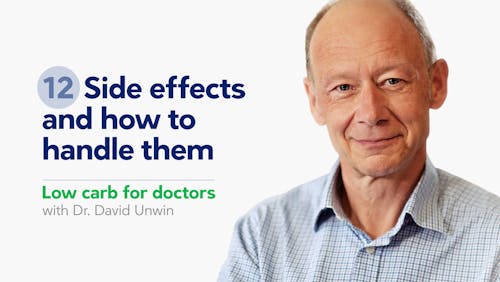
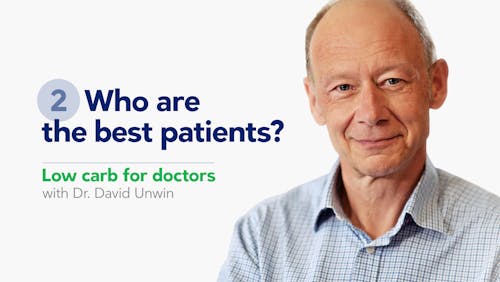
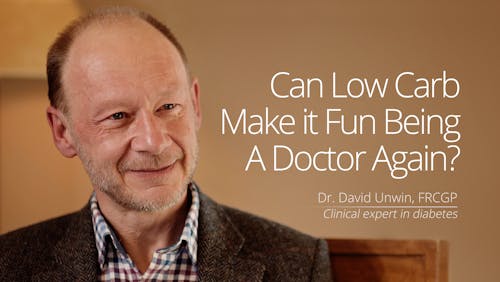
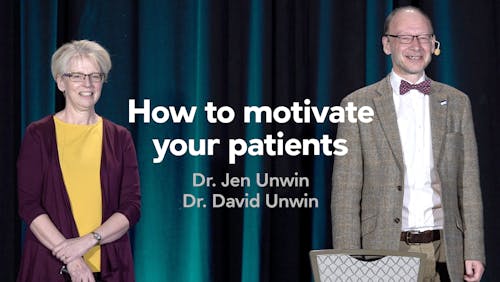
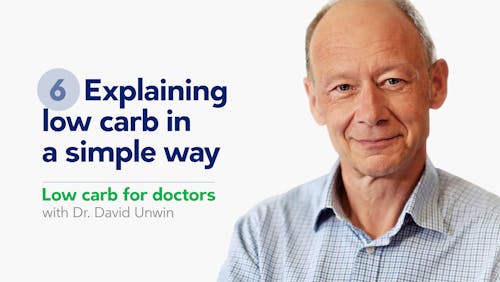
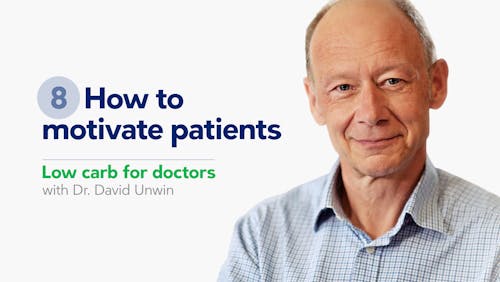
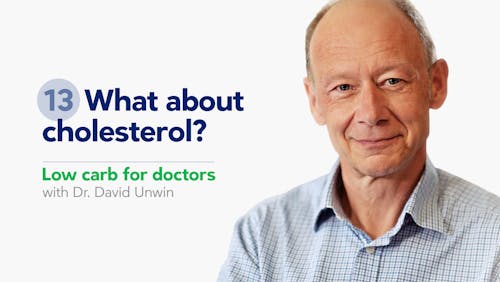
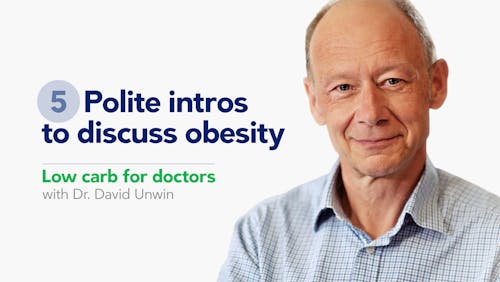
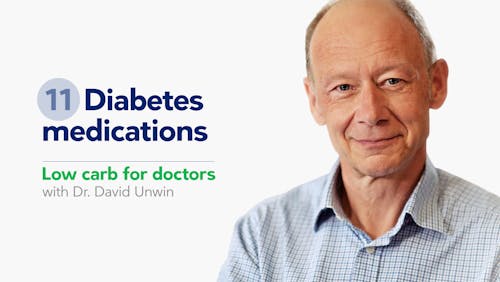
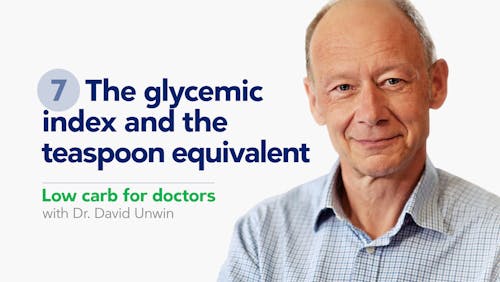
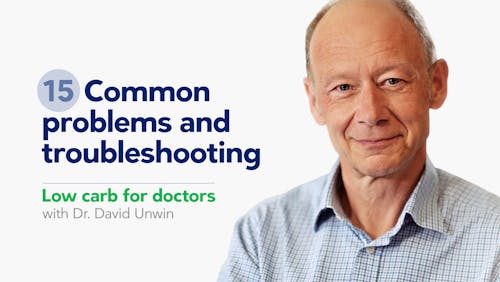
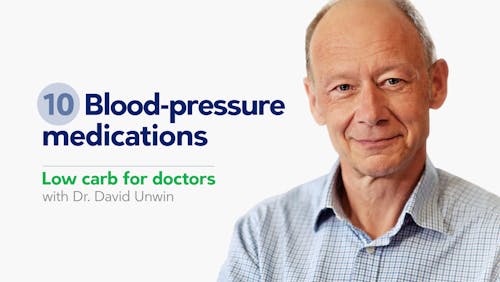
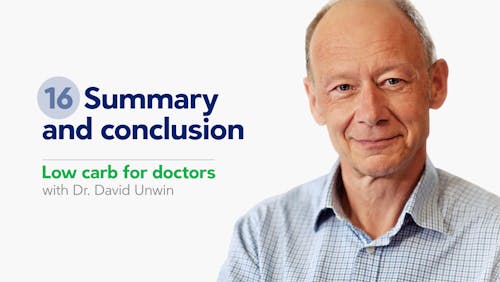

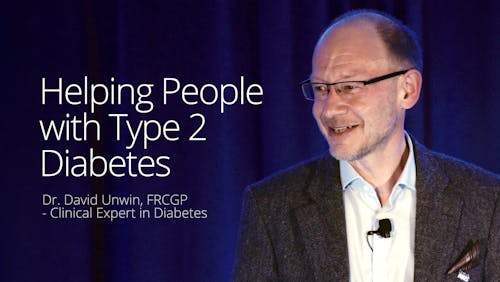
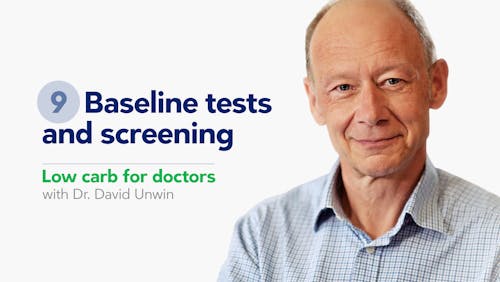
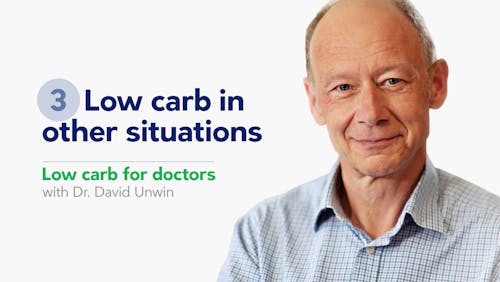
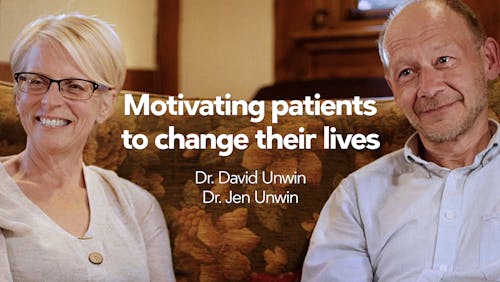
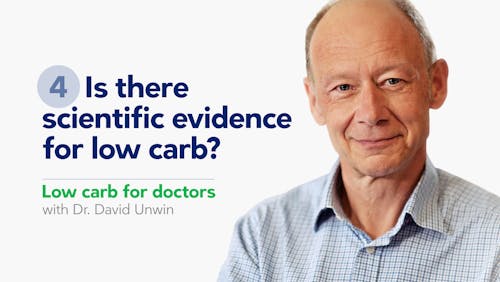
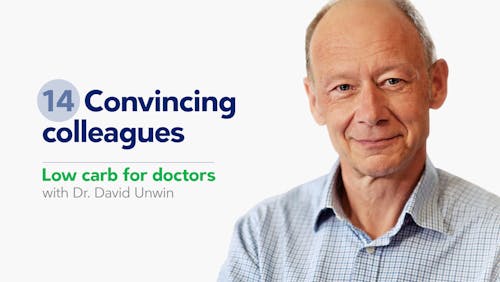
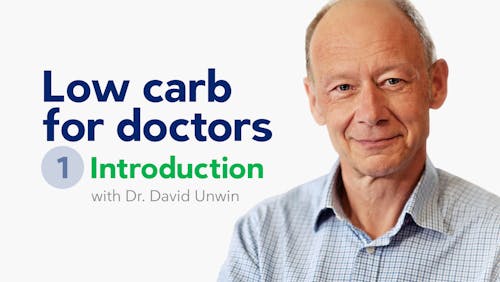
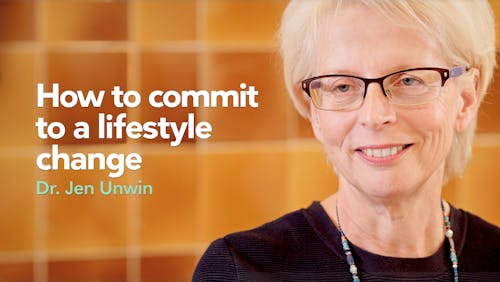
 Courses
Courses
